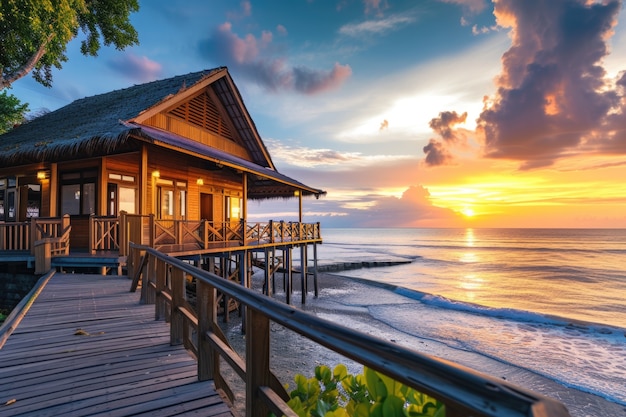
Imagine waking up in a private pool villa in Canggu, Bali, with the sun shining through the glass windows. Your day could start with a morning surf at a Canggu beach, followed by working at a hip co-working space before grabbing a fresh, healthy lunch.
In the afternoon, you might attend a yoga class, then watch the sunset at Canggu beach with a cold coconut in hand. The evening? There are endless possibilities. Here, anything you want can be delivered to your villa, you can work at any hour, and surf some of Bali’s best waves.
Canggu, Bali is an amazing spot for travelers, digital nomads, surfers, hipsters, vegans, dog lovers, and everyone else. Before settling in Canggu for three months, we spent six weeks in Koh Samui, Thailand. Though that was great, once we arrived in Canggu, we knew it was perfect for digital nomads, entrepreneurs, and anyone with a location-independent lifestyle.
In this guide, you’ll find the pros and cons of living in Canggu, tips on finding accommodation, where to eat, what to do, how to get around, and more. Canggu is about 20 kilometers north of Seminyak and extends from Berawa in the south to Cemagi in the north, covering about 8 kilometers of beach divided into sections: Berawa, Batu Bolong, Echo Beach, and Perenenan.
The main road is Jl. Raya Canggu, and it’s best to live closer to the sea, south of this road. It’s a good idea to explore the area before committing to a long-term rental. Renting a hotel or Airbnb for the first few days allows you to view potential villas in person.
While booking online through reputable websites like Airbnb or Booking.com is an option, if you plan on staying longer, it’s better to see the villa in person. We stayed at Villa Rangga Bodhi in Berawa while searching for our ideal villa. We discovered that many places were not as advertised online, which is why it’s crucial to inspect them yourself.
Finding a villa in Canggu often means living in beautiful Balinese-style villas with unique wooden decor. Many villas have open-air designs with sliding doors, private pools, and garden areas. You can opt for shared villas, guesthouses, or private pool villas. Most villas are larger, with two to five bedrooms, making one-bedroom villas rare. Rental costs vary, with shared villa rooms typically costing 5-8 million IDR ($350-$600) per month, and modern, private two-bedroom villas around 15-20 million IDR ($1,110-$1,480) per month.
For our private pool villa, we paid 20 million IDR ($1,480) per month plus 1 million IDR ($75) for electricity. This included full house cleanings, pool maintenance, upgraded WiFi (20mb/s), and all utilities except electricity. For $50 a night, we had a modern two-bedroom villa with all amenities, including poolside sunbeds and a gated garage.
Canggu also offers excellent Wi-Fi and affordable data plans. You can have up to 100mbps speed, but 25mbps is standard in most villas. For SIM cards and data, 150,000 IDR ($11) for 25GB with 15 minutes of talk time is a great deal. Most cafes have free Wi-Fi, and co-working spaces like DoJo, C’ugh House, and Rou Coffee & Co-Working provide even faster internet and networking opportunities.
Another convenience in Canggu is the GoJek app, allowing you to order massages, motorbike rides, food, cleaning services, and more for tiny fees. GoShop delivers items from any store. You can also use Grab and Uber for transportation.
Canggu boasts a variety of excellent restaurants, offering everything from Indonesian to international cuisine, with many healthy options. Using the GoJek app, you can have meals delivered to your villa for just around $0.50-$1.
Grocery shopping is done at smaller shops like Pepito and Canggu Station, which offer quality imported goods from Australia. For health foods, try Alive Wholefoods Store and Canggu Shop. Don’t miss trying grilled corn from beach vendors, a local delight.
Living in Canggu offers numerous activities. Surf at Echo Beach, Berawa, or Batu Bolong, or try yoga and fitness classes. Enjoy beach bars for sunset drinks, check out live music at places like Konkrete, or explore the area on a motorbike, which is the most common mode of transportation. Bike rentals cost around $4 per day or $55 per month.
Weekends offer market options like Samadi Sunday Farmer’s Market and Love Anchor Bazaar for local produce and unique items.
However, rainy season brings trash to the beaches due to poor waste management. You can volunteer to help keep the beaches clean, or support local animal welfare by donating or fostering dogs.
While westernization is present, there are still traditional Hindu temples like Batu Bolong Temple to visit. Additional trips to nearby areas like Sanur, Jimbaren, Uluwatu, and even Lombok or the Gili Islands are easy to plan.
Renting a scooter is straightforward, but safety is essential. Rates are about 700K ($51) per month, and petrol is 10K ($0.75) per liter. Taxis, private drivers, and ride services like Grab and GoJek are also available.
For medical needs, facilities like BaliMed Hospital, Siloam, and Canggu Medical are reliable, with English-speaking doctors like Dr. Ristie available for consultations.
Living costs for a couple in Canggu can vary. High-end living costs around $2,745 per month, but expenses can be reduced by sharing villas and eating at local warungs.
Overall, Canggu Bali offers a fantastic balance of affordable, high-quality living with plenty of amenities, making it an attractive destination for digital nomads. The pros far outweigh the cons, making it one of the best places we’ve lived.
I hope you found this guide useful. If I missed anything, let me know in the comments below!
